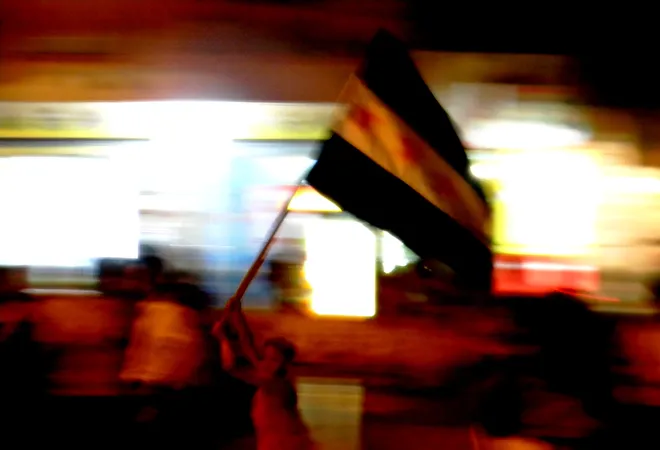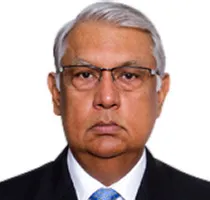Ideology and ideas derived from it rarely perish. They become dormant and survive even if the physical manifestation of an ideology is extinguished. The liberation of Raqqa, the so-called capital of the proto-Caliphate, established by Abu Bakr Al-Baghdadi in June 2014, brings to an end the anachronistic quasi-state.
The liberation of Raqqa was announced recently by the American–supported militias, comprising Arabs and Kurdish fighters. Baghdadi was an Islamic scholar who was in the custody of the US military in Iraq for almost a year, in 2004, as prisoner number US9IZ-157911CI. For over three years, the so-called Caliphate, a hard-line Sunni outfit, acted as a magnet for global jihadis who joined Baghdadi’s murderous hordes.
Motivated by a hate-filled ideology, bloodlust directed at Kafirs or non-believers and more mundane sexual fantasies, they managed to hold territory and administer it with brutality, harking back to the mediaeval era. The ISIS applied the Takfiri doctrine against Muslims, particularly Shias, and murdered them in large numbers. The appeal of the Caliphate in Baghdad and Syria had a special attraction because of Islamic history. The original Caliphate was based in this geography and that added to its appeal. The last Caliphate of the Ottoman Empire was abolished by Kemal Attaturk, after the 1st World War when he declared Turkey a secular republic.
Baghdadi’s regime
Baghdadi’s ‘Caliphate’ ran the most brutal and vicious administration that included gory public beheadings for crimes, including even simple offences such as not praying and smoking. Their agenda of sexual slavery included regular auctions of captured non-Muslim women from the non-Muslim minority Yazidi community, Christians and others. The women included young teenagers who were bought and raped by Baghdadi’s fighters.
They justified their brutality and perversion by misinterpreting the Quran, Hadith and the Sharia. Baghdadi’s monstrous project has ended but there is no evidence that this man is dead, though several sources have claimed that he may have died.
The forces unleashed by the short-sighted American invasion of Iraq and its covert war for regime change in Syria, are still swirling around in the region, even after the defeat of the ISIS. The underlying causes that bought about the formation of ISIS remain in place. The ISIS will be in retreat but will re-emerge in geographical pockets as insurgencies and disperse into other Muslim states. Splinter groups will continue to dream about a Caliphate and act to re-create it elsewhere.
The fall of Raqqa will, however, remove the cloak of legitimacy of a territorial state. Moreover, the ISIS has suffered very heavy casualties while defending Raqqa and their military and financial assets stand heavily degraded. ISIS fighters have also fled to other areas to regroup. They are likely to find support from various affiliates in North African countries and nearer home in Afghanistan and Pakistan which have pledged loyalty to ISIS.
are likely to find support from various affiliates in North African countries and nearer home in Afghanistan and Pakistan which have pledged loyalty to ISIS.
The next wave of violence may well occur in these countries and Western countries where ISIS cadres and sympathisers have sought refuge. The head of UK’s MI5, its external intelligence agency, has publicly stated that Western countries should be prepared to confront a wave of terrorist attacks following the fall of Raqqa. It seems clear that the forces unleashed by American intervention in the region have not dissipated and the West will remain a target, giving ballast to the saying that “as you sow, so shall you reap.”
It would be premature to claim any victory since there is no common political vision and the powers that are engaged in the region continue to pursue competing geostrategic objectives. The American-led “Operation Resolve”, comprising 69 countries and four partner organisations, has been focussed only on eliminating ISIS with a massive bombing campaign of Raqqa.
Ironically, it was in Raqqa that the American had started their covert regime change campaign by arming the Sunnis, including Al-Qaida affiliates who were unhappy with the non-Sunni Assad regime in Syria. The American also followed the old dictum of arming some “good terrorists” in Syria for regime change. These groups later morphed into the ISIS. If the ISIS had not earned the brutal notoriety that it did and continued to fighting the Assad regime, the Americans and their European and Arab allies would have not turned against them.
There are many countries now involved in Syria — Jordan, Iran, Israel, Qatar, Russia, Qatar, Turkey, UAE, USA and NATO. Turkey’s role is noteworthy. Turkey was quite friendly with the Assad government, but decided to topple Assad after the 2011 civil disturbances and Assad’s heavy handed suppression of civilian demonstrators. Turkey joined hands with the Gulf Arab states, Saudi Arabia, Qatar and UAE to subvert the Assad government.
The Americans and Israelis also became part of this conspiracy. Turkey even winked at the fund-generating oil exports of the ISIS and Turkish Intelligence armed and trained pro-Turkish Syrian militias, under the banner of the Free Syrian Army , in northern Syria which shares a border with Turkey. The blowback effect in Turkey was the flood of refugees and terrorist attacks on its soil.
Turkey is now spearheading an expanded military intervention in Syria after agreement with Russia and Iran to establish a de-escalation zone in North-West Syria, around the area of Idlib with the objective of clearing the area of ISIS and Syrian Kurdish fighters . Turkey has long had a Kurdish problem and is scrambling to prevent Syrian and Iraqi Kurds from linking up.
The recent Iraqi Kurdish referendum which voted for independence is a trend that is worst nightmare for Turkey. For Turkey, the immediate priority is to stop more refugees fleeing into Turkey, to isolate the Kurds and shape the end-game in Syria that is at odds with Russian and Western objectives.
The recent Iraqi Kurdish referendum which voted for independence is a trend that is worst nightmare for Turkey. For Turkey, the immediate priority is to stop more refugees fleeing into Turkey.
Consequences for Syria
What does all this mean for the future of Syria? One thing is clear. Syria cannot revert to its pre-civil war status, with a minority Alawite government headed by Bashar Al Assad. Too much blood has been split and too many Syrians have become refugees. The Sunni majority will not accept Assad and the various armed militias will not surrender to Assad government forces.
In Raqqa, control of the city will likely be in the hands of the American-backed Syrian Democratic Forces . Syria is still in a maelstrom and is a patchwork with broadly four zones. The Assad regime controls Western and Southern regions, the Northern region is with the Kurdish groups, opposition groups are in control in pockets around Aleppo, Homs, Damascus and Dara in the Western region and till the fall of Raqqa, the ISIS controlled the central region.
It seems that Syria’s fate will be decided by Russia, Iran, Turkey and the USA. With Western pressure to dump Assad immediately having waned, any political deal will keep Assad in place. It is unlikely that Syria will fracture into autonomous zones leading to new independent states. One major reason is that no one wants to give the Kurds an independent state.
With the ISIS in retreat and disarray, countries involved in Syria will have to rise above the power struggle that led to foreign intervention in the Syrian civil war. This may be a pious hope since the ethnic and sectarian cleavages in Syria have become unbridgeable. Syria, therefore, is likely to see continuing strife and internal conflict in the future.
This commentary originally appeared in Catch News.
The views expressed above belong to the author(s). ORF research and analyses now available on Telegram! Click here to access our curated content — blogs, longforms and interviews.




 PREV
PREV


